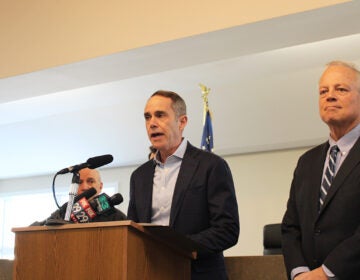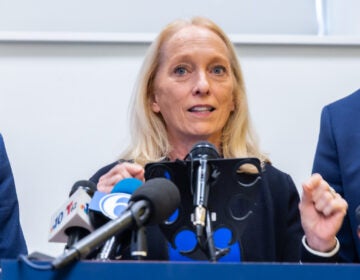Bucks County Democrats, elected officials urge state legislators to fund SEPTA ahead of deadline
Elected officials and residents expressed concerns over how SEPTA cuts could impact students, seniors and commuters who live in the suburbs.
Listen 1:13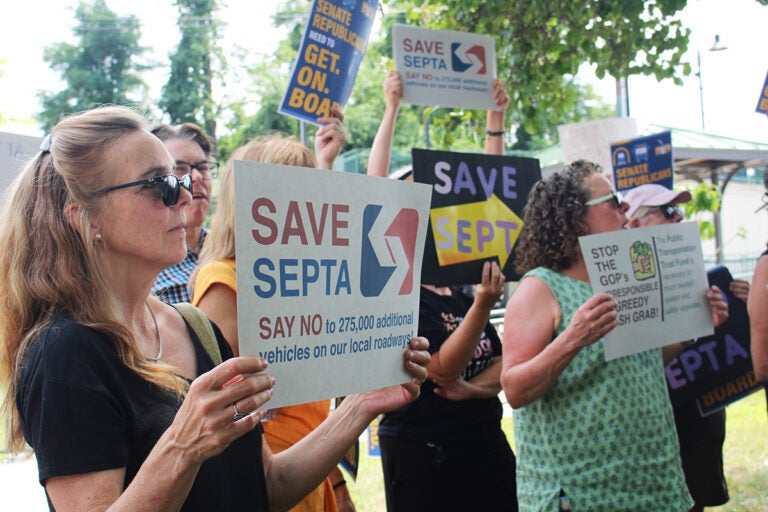
Residents held signs in support of funding for SEPTA as Democratic elected officials and residents spoke at a rally at the Yardley station, Aug. 14, 2025. (Emily Neil/WHYY)
From Delco to Chesco and Montco to Bucks, what about life in Philly’s suburbs do you want WHYY News to cover? Let us know!
Bucks County Democrats, elected officials and residents rallied Thursday afternoon at SEPTA’s Yardley station, demanding funding approval for the transit agency.
“We’re here today, on the 14th of August, over six weeks since a budget should have been passed and since funding for mass transit should have been accomplished, to say that it is time,” said state Sen. Steve Santarsiero. “It is past time. We need our Republican legislators, our Republican members of the state Senate, in particular those here in the southeastern part of the state, to step up and demand from their leadership better. Not this cynical attempt to just make it look like they’re doing something when they’re not.”
SEPTA is facing a more than $200 million budget shortfall. Without an influx of state funding, the transit agency plans to cut 45% of its services in the next year.
The Republican-controlled state Senate passed a budget Tuesday allotting $292 million for public transportation and infrastructure, per Gov. Josh Shapiro’s request. But the bill proposes drawing those dollars from the Public Transportation Trust Fund rather than sales tax revenue, as Shapiro and Democrats have recommended.
On Wednesday, a House committee voted against the bill, with SEPTA General Manager Scott Sauer and PennDOT Secretary Mike Carroll speaking in opposition to the legislation.
Santarsiero said Thursday that the Senate bill is a “hollow gimmick,” but represents “an important step” because it shows Republicans are acknowledging that transit funding is a problem. Using money from the Public Transportation Trust Fund is “not a solution,” he said, and amounts to “taking money out of one pocket of SEPTA and putting it in the other.”
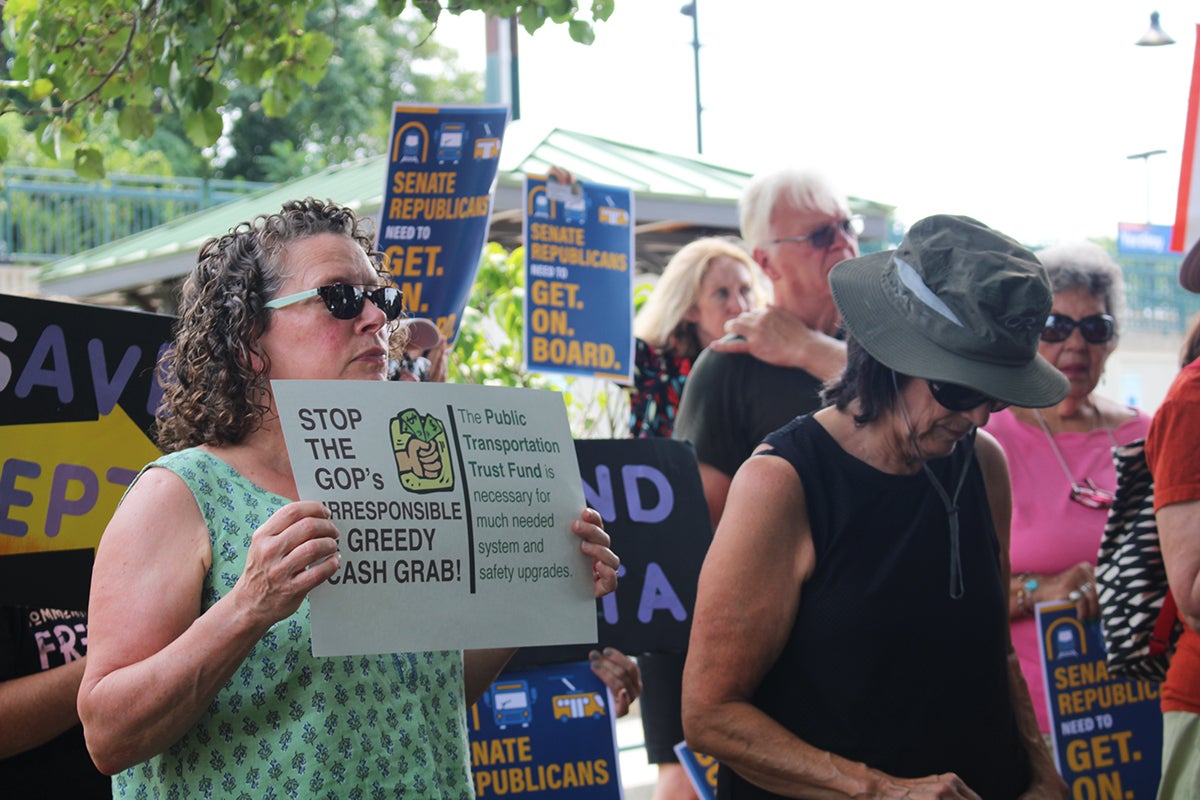
Both sides of the aisle need to reach an agreement on a recurring revenue stream to fund SEPTA and mass transit throughout the state, he said.
“When SEPTA wants to go and buy a new bus, or repair an existing bus, buy a new train, repair a train, put down rails, repair rails, all the infrastructure … they rely on that money,” Santarsiero said. “So taking that money away to give toward operating costs is not really a solution, because on the back end, SEPTA is still going to be short and it’s still going to face this budget crunch.”
State Sen. and Majority Leader Joe Pittman told WHYY News in a statement that Tuesday’s bill was “a responsible budget & immediate way to fund transportation infrastructure & mass transit without taking any more from taxpayers.”
“Democrats need to stop grandstanding at press conferences & start to seriously engage at the negotiating table,” he said.
If lawmakers do not pass a budget to fund the transit agency by Thursday night, SEPTA will begin to make 20% service cuts set to take effect Aug. 24. Frequency of many Regional Rail, bus, subway and trolley routes will be reduced, and 32 bus routes will be eliminated.
On Sept. 1, bus and metro fares will increase to $2.90 per trip.
Bucks County Commissioner Bob Harvie, who also sits on SEPTA’s board, said the failure to fund mass transit represents “an assault on working families” in the region.
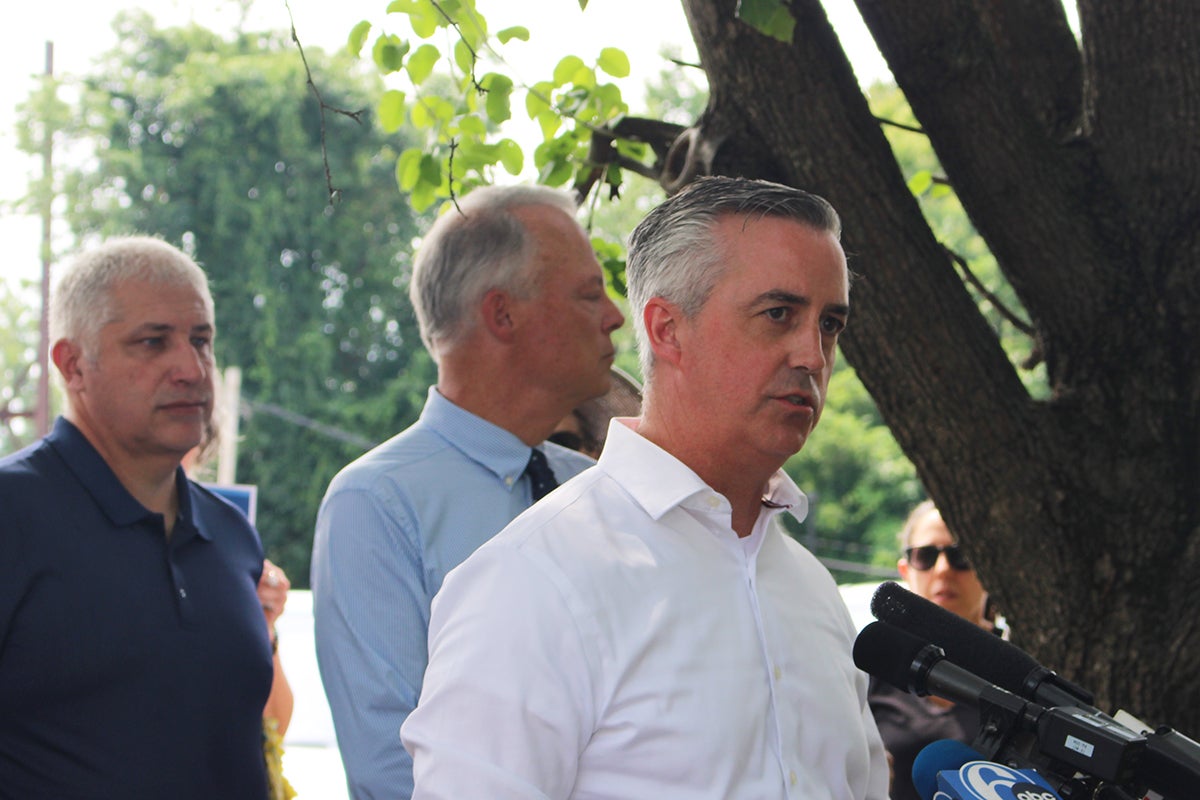
Harvie said in the year and a half since he joined the board, the agency launched an austerity program that saved more than $30 million a year.
“The cuts that are going into effect are not what SEPTA wants to do,” he said. “We want to launch the Bus Revolution. We want to modernize our trolleys. We want to do the work on our stations to make sure that they’re accessible to everybody. We want to launch the signage improvements that we have planned. We want to do all the things that have been worked on now by a board that cares and the staff that cares about the people they serve. It’s time for the people who have been elected to serve to actually act like they care.”
Wayne Vaccaro, 67, lives in Yardley and uses Regional Rail to get to his doctor’s appointments.
“Most of them are in Philly, so it’s very convenient,” he said. “I can get down to Philly if I need to by driving, but I’d rather just take the train.”
He said he hopes legislators allocate enough funding for SEPTA to be able to continue its current services and upgrade the system as needed.
“There’s a lot of people that live close to take this,” he said of the West Trenton Line. “Every time I take the train, it’s quite a few people get on.”
State Rep. Jim Prokopiak said Regional Rail helps seniors get around, and that it enables health aides and other care workers to commute from the city to jobs in Bucks County.
“Without SEPTA, without other mass transit, those jobs aren’t filled,” he said. “People aren’t being taken care of. That’s a problem.”

Speakers cited the impacts reduced or eliminated service would have on students, commuters and seniors, as well as projected traffic increases with more cars on the road throughout the region.
Santarsiero said he and other legislators are “prepared” to go to Harrisburg tonight to pass a bill ahead of SEPTA’s deadline to implement the first round of cuts, but said he is “skeptical” that a compromise will be reached before midnight.
“It would probably be better to see whether there can be agreement reached on that before we talk about actually putting pen to paper and proposing more legislation,” he said.
A spokesperson for Shapiro said in a statement that the governor is working with both parties to pass a final budget deal.
“The Governor is in the Capitol, continuing to work at this with a relentless focus on delivering for the kids who need SEPTA to get to school, the hard working Pennsylvanians who depend on it to get to and from work, and the communities that power our economy and rely on the system,” he said. “Governor Shapiro will continue working to narrow the differences between the House and the Senate in order to get this done.”

Get daily updates from WHYY News!
WHYY is your source for fact-based, in-depth journalism and information. As a nonprofit organization, we rely on financial support from readers like you. Please give today.






